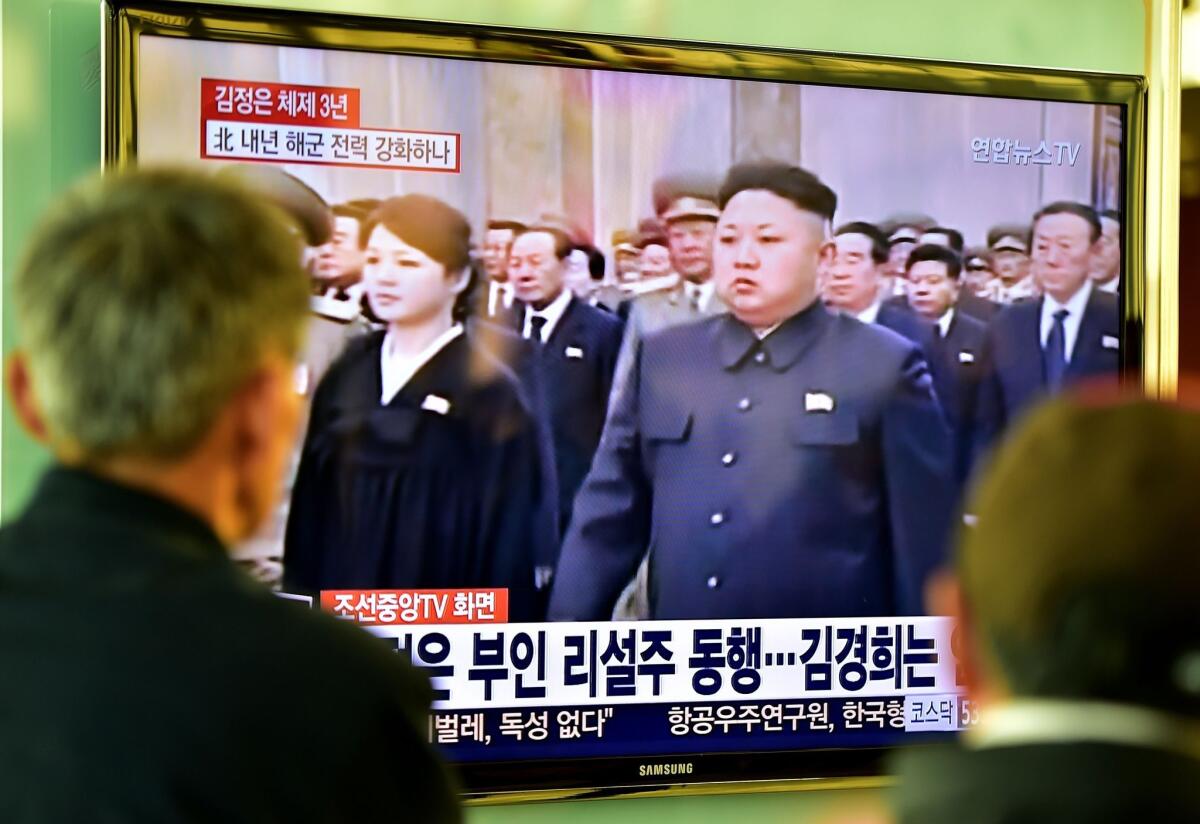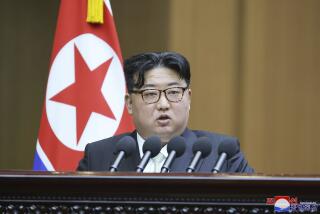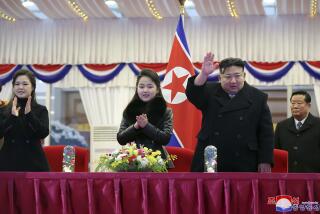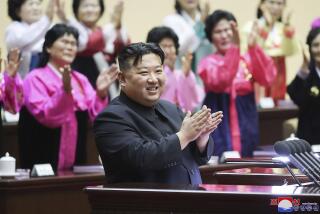North Korea marks third anniversary of Kim Jong Il’s death

North Korea on Wednesday marked the third anniversary of the death of former leader Kim Jong Il, ending a traditional period of mourning and setting the stage for his son Kim Jong Un to further entrench himself as the country’s unchallenged leader.
A ceremony was held at Kumusan Palace of the Sun in the capital, Pyongyang, where Kim Jong Il’s body lies in state. Kim Jong Un was seen paying tribute along with his wife, Ri Sol Ju, in a broadcast by Korean Central Television, North Korea’s official TV network.
North Korean state media reported that all North Koreans observed three minutes of silence at noon, and that all car and trucks sounded their horns.
Though the commemorations were relatively low-key, the passing of the third year since Kim Jong Il’s death is significant in that it marked the end of the customary Korean three-year mourning period after the passing of a parent. Since Kim Jong Il’s death, North Korea’s one-party system of governance has been kept almost unchanged, and in theory, Kim Jong Un could now seek to institute his own system.
“The end of the three-year mourning period can be used as a chance for Kim Jong Un to change the system and more thoroughly consolidate his power,” said Chang Yong-seok, a senior researcher at Seoul National University’s Institute for Peace and Unification Studies.
Kim Jong Un, believed to be in his early 30s, took over leadership of the isolated and impoverished country as a young and untested successor to his father. Early in his rule there were questions about whether he could win the allegiance of the older and more experienced men in the upper echelons of government. He appears to have been able to build a firm grip on power.
In recent days North Korea’s official media have run stories detailing Kim Jong Un’s accomplishments, including among them his purge of his uncle, Jang Song Thaek. Jang was the most prominent of officials from the Kim Jong Il era that Kim Jong Un has purged, in an apparent effort to put more people that are loyal to him in powerful positions.
Kim Jong Il was well known in the West for his eccentricities, including his bouffant hairstyle, high-heeled shoes and huge film collection. He was generally reclusive and made few public appearances. As leader, Kim Jong Un has adopted a style more similar to that of his grandfather, North Korea founding leader Kim Il Sung, who carried himself in a more public, outgoing manner.
Like his grandfather, Kim Jong Un is often photographed at public events, grinning and hugging people, something his grandfather did often but his father avoided. Also unlike his father, Kim Jong Un regularly appears in public with his wife.
Kim Jong Il rarely traveled abroad, and his son has not ventured out of North Korea since taking over as leader. But on Wednesday, the Asahi Shimbun, a major Japanese newspaper, reported that Kim Jong Un has been invited to Russia to attend a ceremony in May marking the 70th anniversary of the Soviet Union’s victory over Nazi Germany.
The newspaper quoted unnamed sources who said that the invitation had been conveyed to Kim through Choe Ryong Hae, a senior North Korean official who last month met with Russian President Vladimir Putin in Moscow. If Kim does make the trip, it would be his first known trip abroad as North Korean leader.
The South Korean government did not convey an official gesture of condolence for the anniversary of Kim Jong Il’s death. On Tuesday, one South Korean politician traveled to the border city of Kaesong in North Korea to present flowers. Opposition lawmaker Park Jie-won made the trip on behalf of Lee Hui-ho, widow of former South Korean President Kim Dae-jung. Lee, 92, went to North Korea for Kim Jong Il’s funeral in 2011, but was unable to travel this year due to her frail health.
Kim Dae-jung was in office from 1998 to 2003, and was the architect of the “Sunshine Policy,” a strategy that saw South Korea provide the North with unconditional aid in the hope of improved relations and eventual reunification.
Borowiec is a Times special correspondent.
More to Read
Start your day right
Sign up for Essential California for news, features and recommendations from the L.A. Times and beyond in your inbox six days a week.
You may occasionally receive promotional content from the Los Angeles Times.






